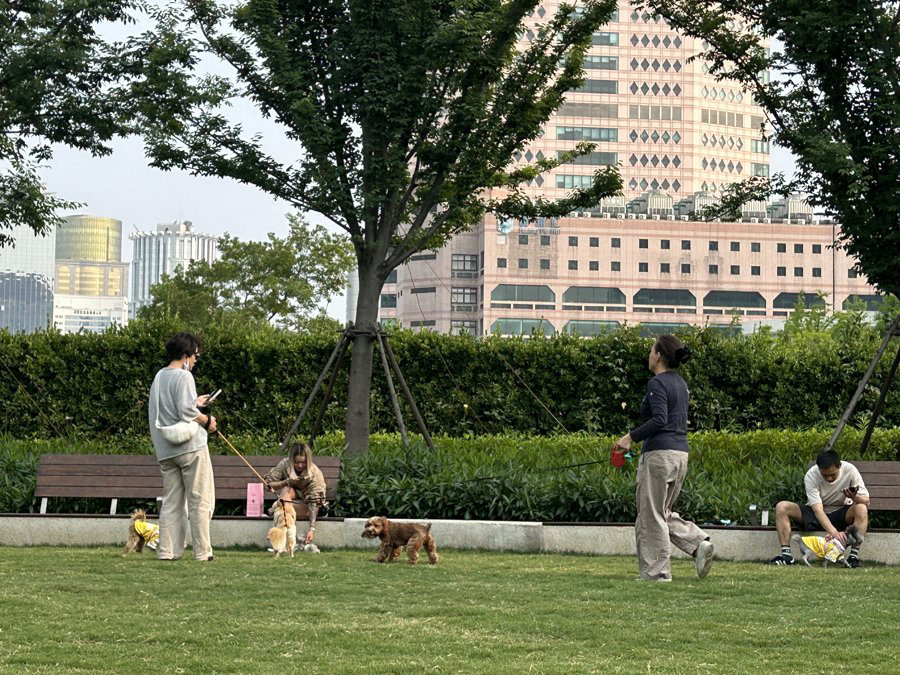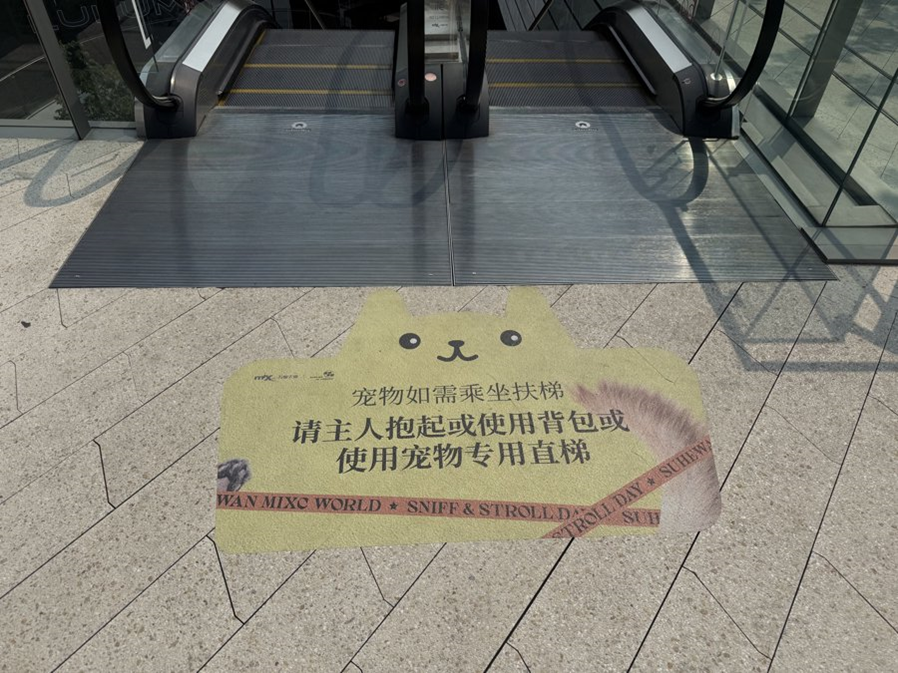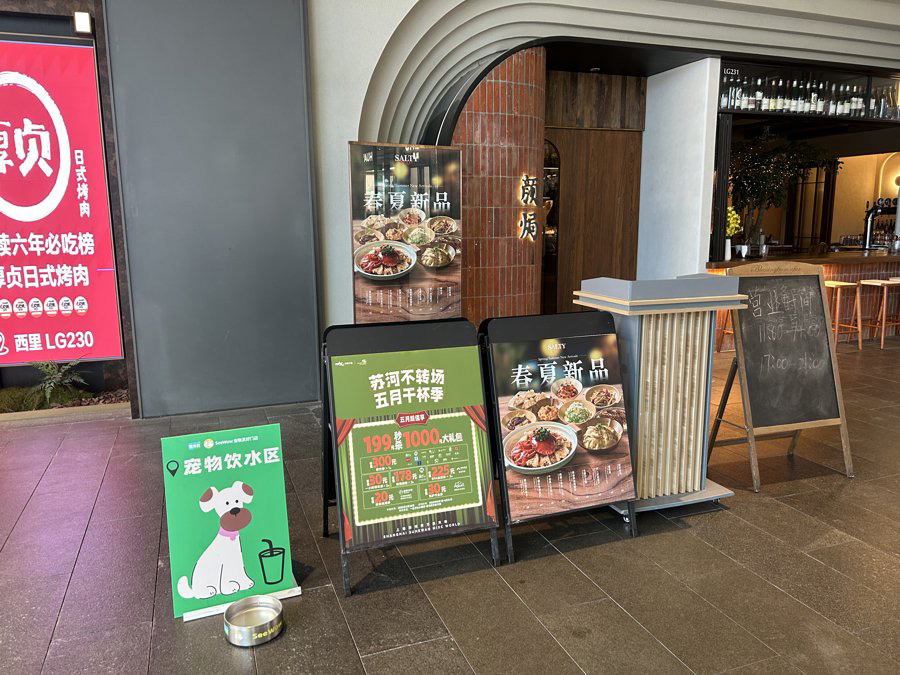
News list
新闻列表
For residents living near the Suzhou Bay Wanda Plaza, taking their "furry children" to stroll around the mall in the morning and evening has become almost a daily routine. Here, consumers can bring their pets to eat, shop, or participate in various pet community activities. The "2025 Pet Fashion Trends White Paper" released during this year's Shanghai Pet Fashion Week shows that the number of pets in China exceeded that of infants under 4 years old for the first time last year. The size of the Chinese pet market has exceeded 700 billion yuan and is expected to reach 1.15 trillion yuan by 2028. Driven by the continuously rising "it economy", a group of commercial real estate properties have opened up "pet friendly" explorations like Suhewan Wanda Plaza. According to statistics from JLL, the proportion of newly opened store formats in Shanghai's shopping centers last year was 2.1% for pet and other service formats, an increase of 0.6 percentage points compared to the same period last year. By introducing pet consumption formats, increasing pet friendly facilities and services, and strengthening civilized conventions, pet friendly shopping malls are attracting customers with cute pets and building a new consumption track.
 Leveraging the 'Pet Economy'
Leveraging the 'Pet Economy'
Looking at the world, with the increasing number of pets, the relationship between people and pets is becoming closer, and the "pet content" of social public spaces is also constantly increasing. Taking the United States as an example, survey data from local research institutions shows that 70% of households in the United States own pets, 82% of pet owners consider their pets as children, and the pet economy is nearly $150 billion. Driven by the demand for companion pet emotions, approximately 68% of non pet specialty retail stores allow customers to bring pets inside, including high-end department stores such as Nordstrom. Although the domestic pet market started relatively late, it has entered a period of rapid development in recent years, which has driven a number of shopping malls such as Xijiao Bailian, West Coast Dream Center, and Suhewan Wanda Plaza to open their doors to pets. The White Paper on Pet Fashion Trends in 2025 analyzes that the penetration rate of pet owning households in China has reached over 30%, indicating that the industry has gradually entered the "popularization stage" from the "cultivation period". From Maslow's theory of needs, people's demand for pet ownership will gradually extend from the basics to higher levels, which means that pet consumption is upgrading. Whether from the commercial or industrial side, it is a vast 'blue ocean', "said Lu Pingyi, Chairman of POP Trends website, who co released the report.

The first step in transforming into a pet friendly shopping mall is to introduce pet related businesses and attract more pet owners to come and consume. Suhewan Wanda Plaza has set up a whole floor pet themed area in the east of the mall, offering a variety of services such as pet care and beauty, pet fresh food, day care and foster care, and pet photography. Multiple pet friendly concept stores have settled in Xijiao Bailian, providing pet owners with pet yoga experiences, pet swimming, and other leisurely ways to walk their pets. However, pet friendly shopping malls are not entirely equivalent to pet business malls. 'Pet friendly' creates a magnetic attraction for pet owners by providing relevant services, and meets their various consumption needs on this basis. "Huang Jingqin, General Manager of Shanghai Suhewan Wanda Plaza, said that on the one hand, the gross profit margin of offline stores in the pet industry is not high and still needs to grow; On the other hand, pet owners actually cover all age groups, from young people to the "silver haired generation", and their consumption needs include but are not limited to pets. Therefore, the commercial attribute of pet friendly shopping malls is still comprehensive retail. Taking Suhewan Wanda Plaza as an example, half of the shops are for catering, while the other half are for service support and retail. Among them, pet related stores account for about 10%.
Create a pet friendly space
From the successful experience of pet friendly shopping malls at home and abroad, in addition to targeted adjustments in business formats, more emphasis is actually placed on openness and tolerance towards pets. That is to say, it is necessary to create a space suitable for pets to enter and exit in terms of hardware, as well as to create a welcoming atmosphere for pet carrying customers in terms of software. The reporter observed that shopping malls with open spaces usually have more potential for renovation. Xijiao Bailian was once the first open garden shopping center in China, and after reopening in 2023, it has become a paradise for people and pets to coexist. Suhewan Wanda Plaza also comes with its own "gene lottery". The 60000 square meter open commercial space of the project is organically integrated with the 42000 square meter urban green park, forming a well connected spatial structure, which can be said to be a natural venue suitable for pets to have fun. However, even with exceptional talent, it is the "postnatal efforts" of the shopping mall that truly determine whether the door can be opened to pets - in the process of design and construction, through reasonable planning, "hitting" the real needs of pet owners. Many employees of Suhewan Wanda Plaza are already experienced pet owners, and Huang Jingqin also has two cats and a dog at home: "We understand the behavior habits of small animals, which is our design standard

The reporter saw in Suhewan Wanda Plaza that the mall has planned a dedicated pet carrying route, and there are conspicuous stickers in front of each escalator reminding owners to pick up their pets or use backpacks; More than 80% of catering merchants have set up outdoor seating areas, from boutique cafes to specialty restaurants, where pets can enter exclusive areas to accompany their owners during meals; Dafu skewered tavern, Tunamaki and other stores also offer pet snacks to customers. Mr. Zhao, who lives nearby, is surrounded by thoughtful surroundings and takes his golden retriever for a walk every night: "It's easy to see where to rest and where to drink water, and there's no need to panic when taking a special elevator with a large dog. It's worry free and reassuring." In terms of mall atmosphere, Suhewan Wanda Plaza has planned a series of activities since its opening to create a unique social experience and emotional value for pet owners. Launch the Pet Paradise 1.0 campaign in 2023, calling on pet enthusiasts to gather in Suhe Bay; Upgrade to Pet World 2.0 in 2024 and establish an online pet friendly community. In March of this year, the event was iterated again with the launch of the "Tail Swinging Season" themed event. More than 30 brands in the venue joined the "Ronghua Street" plan and carried out activities such as cute pet shows, flash exhibitions, and love adoption. During the event, the passenger flow of Suhewan Wanda Plaza increased by nearly 35% compared to the same period last year, and the revenue increased by 10% year-on-year.
Balance the conflict between humans and pets
The reporter noticed that in recent years, there are not a few pet friendly shopping malls, but there are also many fish and fowl who use the "pet economy" as a traffic gimmick, and have been labeled as "pseudo pet friendly" by consumers, who roast that "except that shopping malls are open to pets, other facilities and services are seriously missing". Huang Jingqin believes that this phenomenon reflects a misinterpretation of "pet friendly" by some impatient businesses: "In fact, the essence of 'pet friendly' is still focused on human needs. When pets have become a part of urban life, people need public spaces that can coexist harmoniously with them. This includes both pet owners and those who are afraid of pets." This means that a true pet friendly business must also protect the rights of pet lovers and respect the differences in their needs. This requires shopping malls to take the initiative, assume corresponding guidance and management responsibilities, understand the real pain points in the coexistence of humans and pets, and invest corresponding costs to balance the conflict between humans and pets. As per the Pet Civilization Convention issued by Xijiao Bailian, cats and dogs entering must be healthy pets that have completed relevant registration procedures. The customer service center on the first floor of the shopping mall provides citizens with pet carts, mouth covers, towing ropes, etc. Within the Suhewan Wanda Plaza, hygiene facilities such as pet collection areas and pet trash cans are placed every three to five steps, and pet specific elevators are also installed to avoid potential conflicts in densely populated areas.

In addition to adding service facilities, "pet friendly" also puts higher service requirements on the staff in the mall. Suhewan Wanda Plaza has developed a set of standard operating procedures based on three years of actual operation experience: the property management has increased the frequency of regular inspections to promptly solve environmental hygiene problems; Establishing a comprehensive customer service response mechanism and customizing exclusive solutions for pet afraid customers... "Our number of cleaners and cleaning costs are much higher than those of ordinary shopping malls. However, at present, the benefits brought by high-quality reputation can cover the increased costs." Huang Jingqin said that the customer flow of Suhewan Wanxiang Tiandi has achieved a 30% growth so far this year.
Looking back at the more mature pet friendly shopping malls in Europe and America today, they have also experienced the process of pets transforming from "consumer objects" to "spatial subjects". Driven by the emergence of the pet economy, increased commercial competition, and relevant policy guidance, we aim to promote the transformation of commercial entities from a single sales scenario to service value-added and ecological symbiosis.
Recently, Shanghai is formulating the first local standard applicable to pet friendly spaces in China, the "Regulations for the Operation and Management of Pet Friendly Commercial Venues and Their Indoor Venues", which means that "pet friendly" will embark on a more standardized and operable path. Huang Jingqin is also pleased to see more peers enter the market: "In modern urban life, the harmonious coexistence between humans and animals has become an important yardstick for measuring the level of social civilization. Commercial places are not only consumption spaces, but should also become urban living rooms that convey humanistic care and promote life equality.

